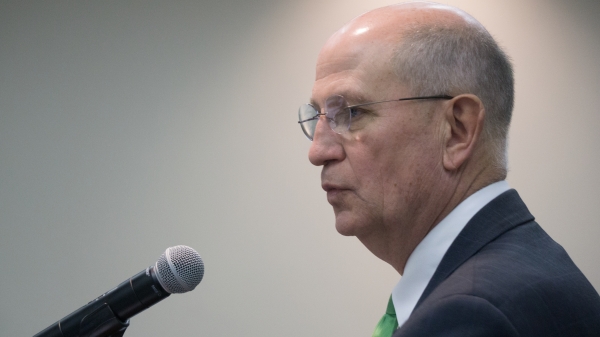Will Dismukes is officially an inmate of the state of Alabama, although he won’t see a day behind bars.
Montgomery Circuit Judge Brooke E. Reid on Monday sentenced the former state representative from Prattville to 20 years, with the first five to be served in community corrections and the final 15 years suspended. He will also have to pay off more than $43,000 in restitution, set at a rate of $1,000 per month.
Upon finishing his community corrections sentence, Dismukes will have to serve two years of supervised probation. Under the community corrections program, Dismukes will still be able to live at his home and work in his community. He will be barred from leaving the state and will have to notify supervisors every time he wants to travel within the state.
The sentence is uncommonly strong for a first-degree theft of property case in which the individual has no prior criminal convictions, but Montgomery County District Attorney Daryl Bailey said this is also the first time in Montgomery County that such a conviction has included aggravating circumstances, which free the judge from presumptive sentencing guidelines.
While the sentence is harsher than most, Dismukes avoided spending any time in prison — which had been sought by the state.
“This was a crime that deserved prison time. Mr. Dismukes abused his position to repeatedly steal thousands of dollars and enrich himself at the expense of others. He betrayed his employer’s, customers’, and the public’s trust,” Bailey said in a statement to WSFA.
Lead prosecutor Sherri Mazur combatted the notion that Dismukes’ case is similar to other theft of property cases brought before the judge, reminding the court that Dismukes stole more than $43,000 from his employer Weiss Flooring over the span of nearly two years, partly while the president was out of office due to cancer treatments.
“That level of evil requires more,” Mazur said.
Reid made it clear that Dismukes is on thin ice, notifying him that any further transgressions will result in time behind bars.
“If you come back (to court) you will be revoked to serve 20 years and I will not bat an eye,” Reid said.
Reid took issue with Dismukes’ refusal to take any responsibility for his actions despite the jury unanimously finding him guilty of the crime.
“The fact that we’re still here with the same old story is a little concerning,” Reid said. “The people who gave you opportunities to succeed are the same people you turned your back on and called liars. I don’t care if it takes the rest of your life, you will pay back the restitution.”
Dismukes’ attorney Rich White told Reid that “sometimes juries get it wrong” and because Dismukes is appealing his conviction, he should not be expected to apologize while maintaining his innocence.
“Just because he maintains his innocence doesn’t mean he is innocent,” Reid retorted.
White also contended that Dismukes had been treated unfairly during the trial, not by the court, but by the prosecution.
“He tried to get in the pretrial diversion program,” White said. “They said “nah, you ain’t doing it.”
Entering the pretrial diversion program would have required Dismukes to plead guilty to the charge, which White said Dismukes was willing to do despite Dismukes now maintaining his innocence. While White argued it is “customary” for defendants facing the charge to be offered pretrial diversion, Reid didn’t find any issue with whether Dismukes was offered that chance or not. He still had the opportunity to plea guilty.
“As the court is aware, this case is politically charged and has sometimes been at the center of media attention,” White wrote in a sentencing memo. “With that said, the press coverage this case has received has prompted the state of Alabama to take a more aggressive approach towards this case.”
Mazur shot down any insinuation that the sentencing has any political motivation.
“From the beginning, this has been about the crime, not politics,” Mazur said. “We never mentioned his political career and we weren’t going to today, but the defense has brought up politics insofar as to call in one of his colleagues and make sure the court knows what party (Democrat) he is. Politics has never been on the lips of the state.”
Rep. Kelvin Lawrence, D-Montgomery, spoke briefly on Dismukes’ behalf, simply telling Reid that he is good friends with Dismukes and calling him “an asset to his community.”
Dismukes also had numerous family members in attendance including his wife, ex-wife, mother, step-children and aunt—but none spoke, and Reid noted that most people being sentenced in criminal cases have families that love them, but that can’t affect the sentence.
Not present were Dismukes’ sisters, who wrote a letter to the judge urging her not to take the suicide of Bill Dismukes, their father, into account as a mitigating factor. The letter says Will Dismukes “helped induce” the death of his father and said it was” time he take responsibility for his own actions.”
Reid referenced the letter in court, although she did not go into its contents. White lambasted the letter as “disgusting” and lamented the fact that the sisters were not present for cross-examination and had not appeared at the trial beforehand. He also insinuated someone had asked them to write the letter.
The letter is written specifically in response to the death of Bill Dismukes, who took his own life a day after Will Dismukes was convicted. If his sisters had been present, they would not have been taking the witness stand, they simply would have been sharing their thoughts on why Will Dismukes should not be given a lenient sentence. There would be no opportunity for cross-examination.
















































